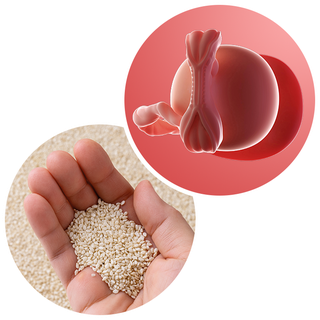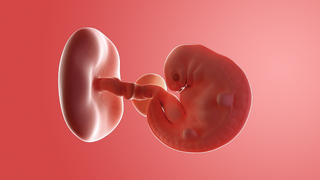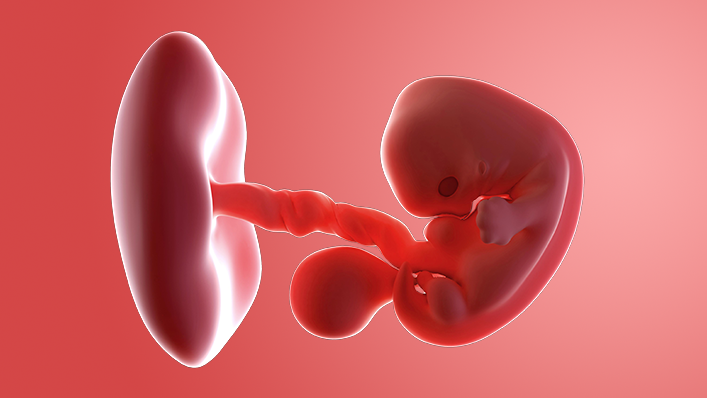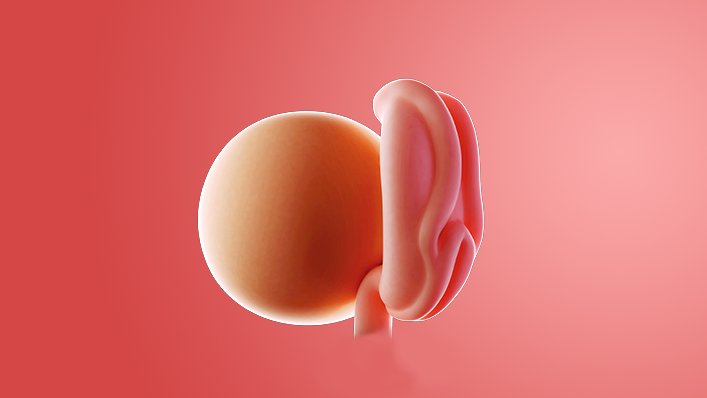Week 5
Many women realise that they're pregnant around week 5. If you're wondering when to take a pregnancy test, now is a good time.
For information on your pregnancy journey, sign up for regular emails tailored to your stage of pregnancy or baby's age.
What's happening in my body?
Your baby's nervous system is developing, and the brain and spinal cord are taking shape. The tiny heart is starting to form and will beat for the first time around now.
Many women realise that they're pregnant around week 5. You might notice that your period is late, and you may feel a bit under the weather.
If you're wondering when to take a pregnancy test, now is a good time as they are sensitive to changes in your urine from week 3 or 4 onwards.
Finding out that you are pregnant can be exciting, but it's normal to have worries too. More than 1 in 10 mums feel anxious during pregnancy.
Try not to keep your worries to yourself – talk to your midwife or doctor. You could also try doing some relaxing breathing exercises.
Food cravings
Are you getting food cravings? Some people do, some do not.
Pregnancy cravings are caused by hormonal changes affecting your senses of taste and smell. Try to eat a balanced healthy diet.
If you have any unusual cravings, like wanting to eat dirt, talk to your midwife or doctor, as you may have a condition called pica which is caused by a lack of iron.
Early pregnancy symptoms (at 5 weeks)
It's still early days, and many women will not know they're pregnant at 5 weeks.
Not everyone has regular menstrual cycles, so you may not realise that your period is late. You might notice some light bleeding, and think it's your period, but it can also be a sign of implantation bleeding (when an embryo attaches to the lining of the womb).
In the 1st trimester, many women feel extreme tiredness. Other early signs of pregnancy can include:
- a metallic taste in your mouth
- sore breasts
- nausea – also known as "morning sickness", although you can experience it at any time (read about morning sickness in week 6)
- mood swings (week 8's page has information on mood swings)
- new food likes and dislikes
- a heightened sense of smell
- needing to pee more frequently
- a milky white pregnancy discharge from your vagina
- light spotting (see your doctor if you get bleeding in pregnancy)
- cramping, a bit like period pains
- darkened skin on your face or brown patches – this is known as chloasma faciei or the "mask of pregnancy"
- thicker and shinier hair
- bloating (read about bloating on week 16's page)
What does my baby look like?
Your baby, or embryo, is around 2mm long (about the size of a sesame seed).
The face is starting to take shape, with a tiny nose and little eyes, which stay closed until around 28 weeks. Your baby's brain and spinal cord are forming rapidly inside you.
Your baby already has some of its own blood vessels and a string of them will make up the umbilical cord. This cord delivers everything it needs from the placenta.
The placenta, which is being created now, will give your baby nutrients and oxygen, while removing waste products.

Action stations
The advice for week 5 is the same as for week 4 – basically keep up the good work looking after yourself!
Sexually transmitted infections (STIs)
Do you think you or your partner could have an STI? If so, get checked out, as this could affect your baby's development. Talk to your midwife or GP, or visit a sexual health clinic.
Long-term conditions
If you have a long-term health condition, then let your specialist or GP know you're pregnant as soon as possible.
Don't stop taking any regular medication without discussing it with your doctor first.
More in week-by-week

Week 6
Your baby is growing and changing at a fast pace.
More in week-by-week guide to pregnancy


